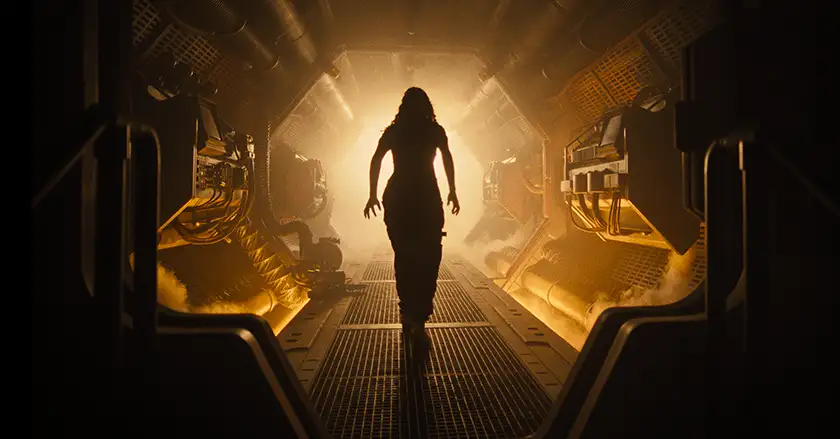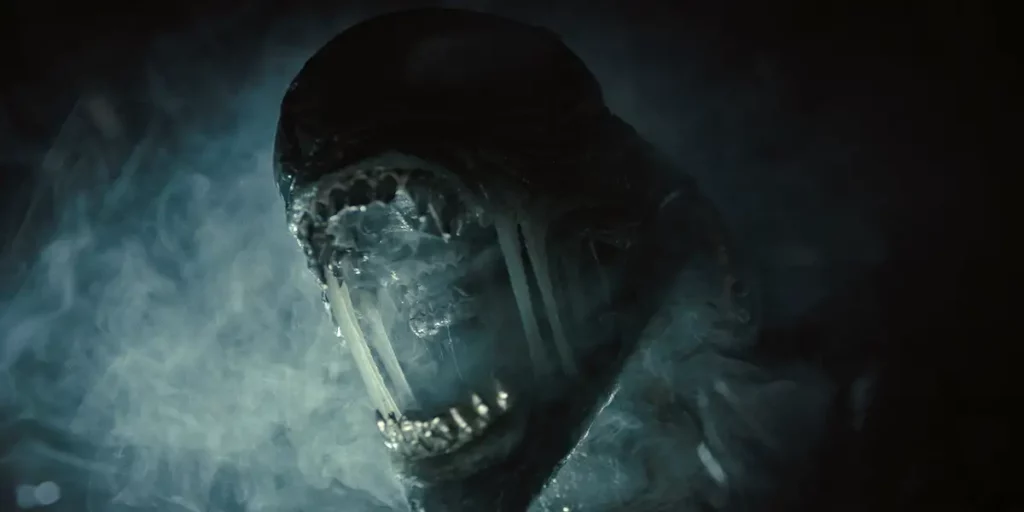Alien: Romulus, the latest film in the iconic franchise, is a nightmarish, formulaic, but ultimately entertaining trip through space.
Director: Fede Álvarez
Genre: Sci-Fi, Horror, Thriller
Run Time: 119′
US Release Date: August 15, 2024
UK & Ireland Release Date: August 16, 2024
Where to watch: in US theaters, in UK cinemas and globally in theaters
Early on in Fede Álvarez’s Alien: Romulus, Rain Carradine (Cailee Spaeny asks her old friend Tyler (Archie Renaux) if his plan to flee to another planet is as easy as it sounds. Predictably, it turns out it isn’t, despite Tyler’s assurances. But the issue isn’t the engine nor is it interpersonal drama between crew members: this being the seventh film in the famous science fiction horror franchise, the problem for our cast of characters is the Xenomorph.
Violent chaos and unrelenting terror ensue as the five-person, one-android crew dwindle in number in gruesome fashion.
Alien: Romulus has a lot to live up to. It was always going to be near impossible for it to match up to Ridley Scott’s first Alien film from 1979. Sitting as a standalone film between the original and its 1986 sequel Aliens, Romulus has more than a few nods to its predecessors. Some of them are welcome, some are lazy, but most damningly, Alien: Romulus is too often guilty of following the script and events of Scott’s original to a frustrating degree. When Álvarez does allow his reboot to unfurl its claws and bare its many teeth into something different and fresh, the director seems afraid to take it too far, always drawing back to comforting nods and nostalgia.
In many ways, Alien: Romulus is as generic as they come; without the Alien franchise label it proudly wears, it would struggle to stand out from the crowd. Álvarez and Rodo Sayagues’ (Evil Dead) screenplay is most guilty of this, stuffed with mostly forgettable characters and queasy dialogue. However, the two main characters, Rain and the android Andy (David Jonsson, Rye Lane), are bright sparks in Alien: Romulus, with Spaeny perfectly slotting into the Sigourney Weaver role and Jonsson bringing all the weird robotic movements and dry humour that we’ve seen before in Ash from Alien or David from Prometheus (2012).
Despite its shortcomings, the latest iteration in this franchise is far from a weak entry. Indeed, Álvarez’s film, whilst being far from memorable, is probably the strongest of these films since the divisive Alien 3 (1992). It is certainly formulaic, but the formula is fired at the viewer with such ferocity and fear that it is hard not to be engrossed. There are also some terrific set-pieces sprinkled amongst the predictability, most notably in the form of a tense lift shaft scene and a late spin on the classic Xenomorph that will surely be explored in future films.

Álvarez showcases his talent at utilising silence, as he did in Don’t Breathe (2016), and ear-splitting noise, seen specifically in his Evil Dead (2013) reboot. His preference for using physical sets and creatures also compliments Alien: Romulus, showcasing the wonder that the restrained use of CGI can create. The set is wonderfully designed and structured, with the action terrifically choreographed to fit it. Benjamin Wallfisch’s (Blade Runner 2049) excellent original score mirrors the film’s stunning contrast of loud and quiet, with the composer’s music operatic in one scene and minimalist in the next.
These strengths of Alien: Romulus make its duller parts that much more frustrating, whilst the terrifying, fascinating twist on the classic Xenomorph design comes too late in the film. Fans of the franchise will lap up the many easter eggs, but in theory, the narrative is flimsy and made up of a lot of guff that is skirted over swiftly. Ultimately, however, we are here for the action and the horror, and whilst Alien: Romulus certainly won’t be the best film you’ll see at the cinema this year, it will likely be one of the most nerve-jangling ones.
Alien: Romulus will be released in US theaters on August 15, 2024 and in UK & Irish cinemas on August 16, 2024.

